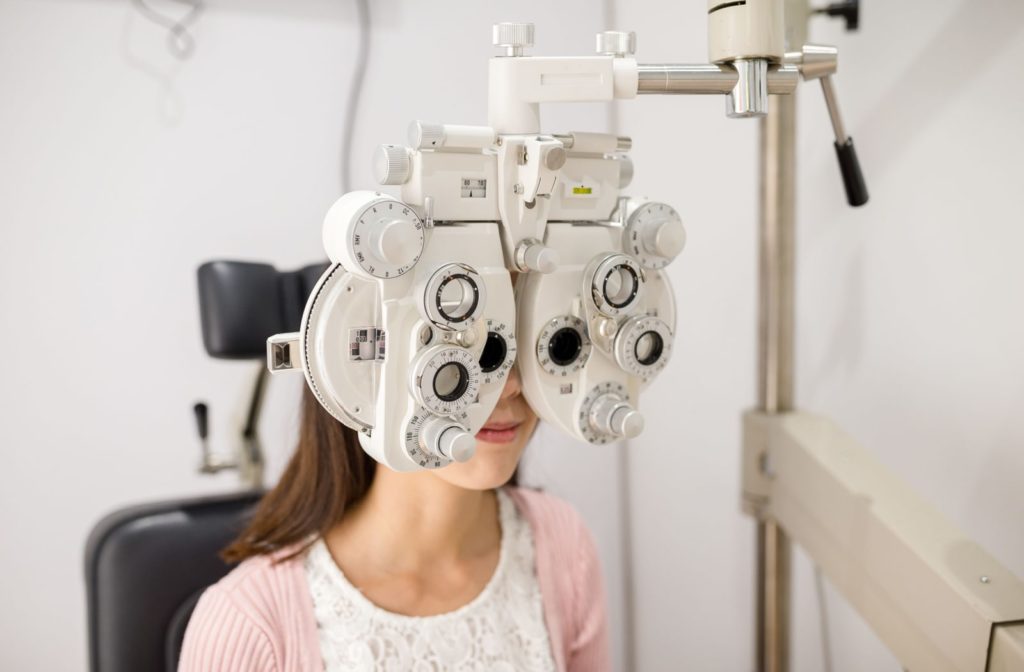Your eye health is an important aspect of your overall well-being, and regular eye exams play a crucial role in maintaining it. But how often should you have an eye exam? The answer to this question may vary depending on your age, general health, and any existing risk factors.
If you’re generally healthy and have no known eye conditions, the recommended interval for an eye exam is every 2 years. This time frame allows your optometrist to monitor any changes in your vision or eye health and detect potential issues early on.
However, there are certain groups of people who may need more frequent eye exams:
- Children: Since their eyes are still developing, children need more frequent eye exams to monitor healthy vision development. The Canadian Association of Optometrists recommends a comprehensive eye exam for children at 6 months, 3 years, and before starting school.
- Adults over 60: As we age, our risk of developing age-related eye conditions such as cataracts and glaucoma increases. For this reason, adults over the age of 60 should have an eye exam every year.
- Those with existing health conditions: If you have diabetes or a family history of eye diseases, your optometrist may recommend more frequent eye exams to monitor your eye health.
If you experience any changes in your vision or other symptoms such as eye pain or redness, you should schedule an eye exam as soon as possible.
General Guidelines for Eye Exams
The Canadian Association of Optometrists recommends that adults ages 19 to 64 should have a comprehensive eye exam at least once every year unless otherwise directed by their optometrist.
During an eye exam, your optometrist will conduct a series of tests to evaluate your vision and overall eye health. These may include:
- Visual acuity test: Measures how well you can see objects at various distances
- Refraction test: Determines if you need glasses or contacts and helps determine your prescription
- Eye muscle movement test: Checks for any issues with eye coordination and muscle control
- Peripheral vision test: Evaluates your side vision
- Pupil response test: Looks for signs of nerve damage or other conditions affecting the pupil’s response to light
- Slit lamp exam: Allows the optometrist to examine the structures of the eye under magnification
- Retinal exam: Checks for any abnormalities or signs of disease in the retina, optic nerve, and blood vessels
These tests can help detect a wide range of potential issues including nearsightedness, farsightedness, astigmatism, presbyopia, colour blindness, eye muscle problems, glaucoma, cataracts and other eye diseases.
How to Prepare for an Eye Exam
For a thorough eye exam, it’s important to come prepared. Here are some tips to help you get the most out of your visit:
- Bring your current glasses or contact lenses with you.
- Make a list of any changes in your vision, new symptoms, or concerns that you may have.
- Bring a list of medications and supplements that you are currently taking.
- Be honest and open with your optometrist about any health conditions that may affect your eyes, such as diabetes or high blood pressure.
- Remember to remove contact lenses before the exam, if applicable.
What Happens After an Eye Exam
After your eye exam, the optometrist will discuss their findings with you. This may include a prescription for glasses or contact lenses, recommendations for further testing, or treatment for any diagnosed conditions.
If you are prescribed glasses or contact lenses, be sure to follow the recommended wear and care instructions provided by your optometrist. It is also important to schedule regular follow-up appointments to monitor any changes in your vision and ensure that your prescription is up-to-date. If any eye diseases or conditions are detected during the exam, your optometrist will discuss treatment options with you.
Tips for Daily Eye Care
Regular eye exams are an important part of maintaining your overall health and well-being. However, there are also steps you can take to keep your eyes healthy in between exams:
- Eat a balanced diet rich in fruits and vegetables, which contain important vitamins and minerals for eye health.
- Protect your eyes from the sun by wearing sunglasses with UV protection when outdoors.
- Practice good hygiene, especially when handling contact lenses, to prevent eye infections.
- Take regular breaks from screens and electronic devices, and remember to blink frequently to avoid dry eyes.
Enhance Your Vision & Eye Health
Eye exams are vital for maintaining good vision and detecting any potential issues with your eyes. So make sure to book your eye exams at intervals recommended by your optometrist.
At Doctors EyeCare Grande Prairie, we are dedicated to providing comprehensive eye care services, including routine eye exams and treatment for various eye conditions. Our team is committed to helping you achieve and maintain optimal eye health. Book your next eye exam with us today.




